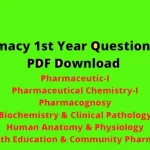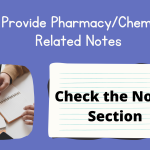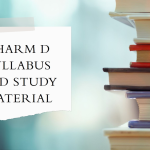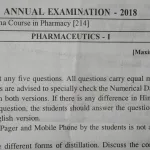The D Pharmacy 1st Year 2018 exam covers multiple subjects essential for pharmacy students. This article presents important questions and their answers across all subjects. These questions will help you understand various topics, including pharmaceutics, pharmaceutical chemistry, pharmacognosy, and human anatomy. Use these as a study guide to prepare effectively for your exams.
Pharmaceutics
Question What is the importance of pharmaceutics in pharmacy?
Answer Pharmaceutics is crucial as it deals with the process of turning a new chemical entity into a medication that can be safely and effectively used by patients.
Question What are the different dosage forms?
Answer Dosage forms include tablets, capsules, syrups, ointments, creams, and injections.
Question What is bioavailability?
Answer Bioavailability refers to the extent and rate at which an active drug ingredient is absorbed and becomes available at the site of action.
Question Define pharmacokinetics.
Answer Pharmacokinetics is the study of how the body absorbs, distributes, metabolizes, and eliminates a drug.
Question What is the role of excipients in drug formulation?
Answer Excipients are inactive substances used in drug formulation to aid the manufacturing process and enhance the stability, bioavailability, and absorption of the drug.
Question What is an emulsion?
Answer An emulsion is a mixture of two immiscible liquids, such as oil and water, with one liquid dispersed as small droplets in the other.
Question What is the difference between ointments and creams?
Answer Ointments are greasy and used for dry skin, while creams are lighter and used for moist skin conditions.
Question What are preservatives, and why are they used in pharmaceuticals?
Answer Preservatives are substances added to pharmaceutical products to prevent microbial growth and ensure the product’s safety and efficacy.
Question Explain sustained-release formulations.
Answer Sustained-release formulations are designed to release a drug at a controlled rate to maintain its therapeutic effect over a longer period.
Question What is the purpose of coating tablets?
Answer Tablet coating is used to protect the drug from the environment, mask taste, improve stability, and control the drug release rate.
Question Define the term ‘sterilization’ in pharmaceutics.
Answer Sterilization is the process of eliminating all forms of microbial life from a pharmaceutical product or equipment.
Question What is an aerosol?
Answer An aerosol is a suspension of fine solid or liquid particles in a gas, often used in inhalers and sprays.
Question What is a parenteral drug?
Answer Parenteral drugs are administered by injection through the skin, bypassing the gastrointestinal tract.
Question What is the difference between a solution and a suspension?
Answer A solution is a homogenous mixture where the solute is completely dissolved, while a suspension contains undissolved particles dispersed throughout the solvent.
Question What is the significance of pH in drug formulation?
Answer The pH affects the solubility, stability, and absorption of drugs. It is important to optimize the pH for maximum drug efficacy.
Question What is lyophilization?
Answer Lyophilization is a freeze-drying process used to preserve drugs by removing water under low temperature and pressure.
Question Explain the role of binders in tablet formulation.
Answer Binders are substances used in tablet formulation to hold the ingredients together, ensuring the tablet remains intact.
Question What is the difference between tablets and capsules?
Answer Tablets are solid dosage forms that are compressed, while capsules contain powder or liquid in a gelatin shell.
Question Define disintegration time.
Answer Disintegration time is the time it takes for a tablet to break down into smaller fragments in a liquid environment.
Pharmaceutical Chemistry
Question What is pharmaceutical chemistry?
Answer Pharmaceutical chemistry involves the study of drugs and drug development, focusing on the design, chemical synthesis, and development of pharmaceutical agents.
Question What is the IUPAC name?
Answer The IUPAC name is the systematic naming of chemical compounds as per the rules set by the International Union of Pure and Applied Chemistry.
Question Define isomerism.
Answer Isomerism is a phenomenon where compounds have the same molecular formula but different structures and properties.
Question What is the importance of stereochemistry in pharmaceuticals?
Answer Stereochemistry studies the spatial arrangement of atoms in molecules, which is important for understanding the activity of drugs, as different isomers can have different biological effects.
Question What are acids and bases according to the Arrhenius concept?
Answer According to Arrhenius, an acid is a substance that increases the concentration of H+ ions in an aqueous solution, and a base increases OH- ions.
Question Define buffer solutions.
Answer Buffer solutions resist changes in pH when small amounts of acid or base are added, and they are crucial in maintaining the pH in drug formulations.
Question What is titration?
Answer Titration is a technique used to determine the concentration of a solution by reacting it with a solution of known concentration.
Question What is a pharmacophore?
Answer A pharmacophore is the molecular framework that carries the essential features responsible for a drug’s biological activity.
Question Explain the concept of drug-receptor interaction.
Answer Drug-receptor interaction involves the binding of a drug to its specific receptor in the body, triggering a biological response.
Question What are the different types of chemical bonds in drug molecules?
Answer The major types of chemical bonds in drug molecules are covalent bonds, ionic bonds, hydrogen bonds, and van der Waals forces.
Question What is the role of organic chemistry in pharmaceuticals?
Answer Organic chemistry is crucial in drug discovery, as it involves the study and manipulation of carbon-containing compounds to create effective medications.
Question What is chromatography?
Answer Chromatography is a technique used to separate, identify, and quantify components in a mixture.
Question What is the significance of melting point determination?
Answer Melting point determination helps identify a substance and assess its purity, as impurities generally lower the melting point.
Question What is the octet rule?
Answer The octet rule states that atoms tend to form bonds to achieve eight electrons in their outer shell, resulting in stable molecules.
Question Define a free radical.
Answer A free radical is an atom or molecule with an unpaired electron, making it highly reactive.
Question What is the importance of solubility in pharmaceutical chemistry?
Answer Solubility is crucial for drug absorption and bioavailability, determining how well a drug dissolves in the body’s fluids.
Question What are electrolytes?
Answer Electrolytes are substances that dissociate into ions when dissolved in water, conducting electricity.
Question What is a coordination compound?
Answer A coordination compound consists of a central metal atom or ion bonded to surrounding ligands.
Question Explain the role of oxidation-reduction reactions in drug metabolism.
Answer Oxidation-reduction reactions play a key role in the body’s metabolism of drugs, affecting their therapeutic action and elimination.
Pharmacognosy
Question What is pharmacognosy?
Answer Pharmacognosy is the study of medicinal drugs derived from natural sources, including plants, animals, and minerals.
Question What is the difference between crude drugs and extracts?
Answer Crude drugs are unprocessed natural substances used in medicine, while extracts are concentrated forms obtained from crude drugs.
Question Define alkaloids.
Answer Alkaloids are a group of naturally occurring compounds that have significant pharmacological effects.
Question What is the role of glycosides in medicinal plants?
Answer Glycosides are plant compounds that have therapeutic properties and are often used in heart medications.
Question What are tannins?
Answer Tannins are polyphenolic compounds found in plants, known for their astringent properties.
Question What are volatile oils?
Answer Volatile oils are aromatic, fragrant compounds extracted from plants, used in aromatherapy and as flavoring agents.
Question Explain the significance of plant secondary metabolites.
Answer Plant secondary metabolites are organic compounds that play a key role in plant defense and have various medicinal properties.
Question What is the difference between primary and secondary metabolites?
Answer Primary metabolites are essential for plant growth and development, while secondary metabolites are not necessary for survival but have important ecological functions.
Question What are the methods of extraction used in pharmacognosy?
Answer Common extraction methods include maceration, percolation, and steam distillation, used to isolate active compounds from natural sources.
Question Define flavonoids.
Answer Flavonoids are plant pigments with antioxidant properties, contributing to the medicinal benefits of many plants.
Question What is the role of herbal medicine in modern healthcare?
Answer Herbal medicine provides an alternative or complementary treatment option using plant-based products for various health conditions.
Question What are resins?
Answer Resins are solid or semi-solid substances derived from plants, often used in medicinal preparations for their healing properties.
Question What is the significance of saponins in pharmacognosy?
Answer Saponins are compounds found in plants that form soap-like foams in water and have medicinal applications, such as lowering cholesterol.
Question Explain the process of standardization in pharmacognosy.
Answer Standardization involves adjusting the concentration of active ingredients in herbal products to ensure consistency and potency.
Question What is the importance of conservation of medicinal plants?
Answer Conservation is crucial to protect endangered medicinal plant species and maintain biodiversity for future drug development.
Question What is the use of mucilage in herbal medicine?
Answer Mucilage is a sticky substance produced by some plants, used for its soothing and protective effects on the mucous membranes.
Question Define the term ‘phytochemistry.’
Answer Phytochemistry is the study of the chemical compounds produced by plants, especially those with medicinal properties.
Question What are essential oils?
Answer Essential oils are concentrated plant extracts used for their therapeutic properties in aromatherapy and medicine.
Question What is the role of antioxidants in medicinal plants?
Answer Antioxidants protect the body from damage caused by free radicals and are important for maintaining health and preventing diseases.
Human Anatomy and Physiology
Question What is the structure of the human cell?
Answer A human cell consists of the cell membrane, nucleus, cytoplasm, and various organelles like mitochondria, endoplasmic reticulum, and Golgi apparatus.
Question Define tissue.
Answer A tissue is a group of cells that work together to perform a specific function, such as muscle tissue or nervous tissue.
Question What is the function of the skeletal system?
Answer The skeletal system provides structure, protects organs, anchors muscles, and stores calcium.
Question What are the different types of muscles?
Answer Muscles are classified into three types: skeletal, smooth, and cardiac muscles.
Question Explain the structure and function of the heart.
Answer The heart is a muscular organ that pumps blood throughout the body, consisting of four chambers: two atria and two ventricles.
Question What is the role of the digestive system?
Answer The digestive system breaks down food into nutrients that the body can use for energy, growth, and repair.
Question What are the functions of the liver?
Answer The liver produces bile, metabolizes nutrients, detoxifies harmful substances, and stores vitamins and minerals.
Question What is the nervous system?
Answer The nervous system controls and coordinates the body’s actions through a network of nerves, the brain, and the spinal cord.
Question Define the endocrine system.
Answer The endocrine system consists of glands that secrete hormones, regulating metabolism, growth, and reproduction.
Question What is the function of blood in the body?
Answer Blood transports oxygen, nutrients, hormones, and waste products, and plays a role in immune response and temperature regulation.
Question What are the components of the respiratory system?
Answer The respiratory system includes the lungs, trachea, bronchi, and diaphragm, facilitating the exchange of oxygen and carbon dioxide.
Question What is the role of the immune system?
Answer The immune system defends the body against infections by recognizing and attacking pathogens.
Question Define the urinary system.
Answer The urinary system eliminates waste products and regulates fluid balance and electrolyte levels in the body.
Question What are the five senses?
Answer The five senses are sight, hearing, taste, smell, and touch.
Question What is the role of the skin?
Answer The skin is the body’s largest organ, protecting against environmental hazards and regulating temperature.
Question Define homeostasis.
Answer Homeostasis is the process by which the body maintains a stable internal environment despite changes in external conditions.
Question What are hormones?
Answer Hormones are chemical messengers produced by glands, regulating various bodily functions like growth, metabolism, and reproduction.
Question What is the lymphatic system?
Answer The lymphatic system helps maintain fluid balance, removes waste, and plays a role in immune defense.
Question Define synapse.
Answer A synapse is the junction between two neurons, where nerve signals are transmitted through chemical messengers.
Latest Posts
- Step-by-step guide to download and apply for jee mains admit card 202
- Comprehensive 2025 government holidays and recruitment details for job seekers
- JEE Mains Admit Card 2025: Your Step-by-Step Guide to Downloading the Hall Ticket
- Everything You Need to Know About 2025 Government Holidays Recruitment
- Comprehensive Guide to rrb d group recruitment 2025 – Eligibility, Vacancies, and Application
- Detailed guide to nps trust recruitment 2025 vacancies, eligibility and apply process
- Comprehensive guide to hpcl recruitment 2025 notification, vacancies, and application process
- ignou bed admission 2025 complete recruitment guide with eligibility and process
- Comprehensive Guide to Indian Army Agniveer Recruitment 2025 Notification and Jobs
- Everything You Must Know About CBSE Board Exams 2025 Changes & New Rules





